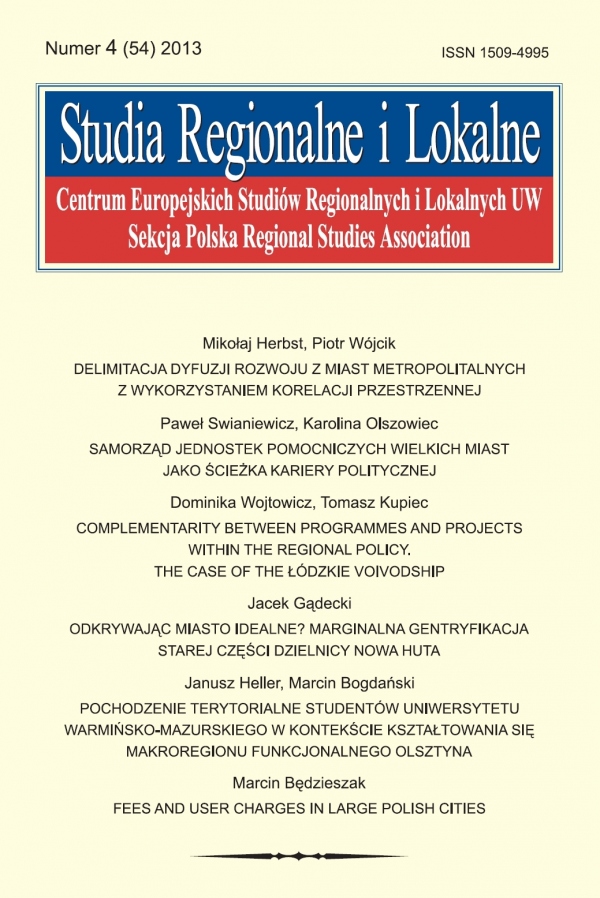Issue:
4(54)/2013
Dominika Wojtowicz, Tomasz Kupiec
Complementarity between programmes and projects within the Regional Policy. The case of the Łódzkie Voivodship
DOI: 10.7366/1509499545403
Komplementarność programów i projektów realizowanych w ramach polityki regionalnej. Studium przypadku województwa łódzkiego
Tocząca się na poziomie Unii Europejskiej dyskusja o wynikach interwencji publicznych oraz przyjęcie koncepcji zintegrowanego podejścia do badania efektów działań podejmowanych w ramach polityki spójności sprawiają, że poszukiwanie mechanizmów podwyższających skuteczność programów i projektów współfinansowanych ze środków unijnych nabiera coraz większego znaczenia. Na podstawie wyników wcześniejszych badań autorzy twierdzą, że skuteczność interwencji publicznych jest większa przy zapewnieniu komplementarności podejmowanych działań. Artykuł porusza więc problematykę komplementarności programów i projektów realizowanych w ramach polityki spójności UE na poziomie regionalnym Polski. Studium przypadku jednego polskiego regionu – województwa łódzkiego – pokazuje, że przyjęte metody i narzędzia, które powinny zapewnić komplementarność, nie działają we właściwy sposób. Wyniki przeprowadzonych badań wskazują na istnienie poważnych ograniczeń w ocenie rzeczywistego stopnia komplementarności i wynikających z niej efektów synergii. Zarówno wyniki analiz dokumentacji, jak i wypowiedzi osób biorących udział w wywiadach pogłębionych sygnalizują, że komplementarność projektów jest mylnie pojmowana lub świadomie wypaczana (w celu uzyskania jak największej liczby punktów na etapie aplikowania), co powoduje, że komplementarność realizowanych projektów nie może zostać uznana za zadowalającą. Przeprowadzone badania umożliwiły autorom opracowanie wniosków i zaleceń odnośnie do rozwiązań, jakie powinny być zastosowane w celu poprawy wdrażania koncepcji komplementarności w kolejnej perspektywie finansowej UE (2014?2020).
Complementarity between programmes and projects within the Regional Policy. The case of the Łódzkie Voivodship
The effectiveness of the measures implemented under the EU cohesion policy has become a significant issue. The relevance of the topic is undeniable, given the ongoing discussion of the results of public interventions conducted at the EU level, and the resulting concept of an integrated approach used to study the effects of actions undertaken within the cohesion policy. Based on various studies conducted to date, the authors argue that the effectiveness of the funds allocated in Polish regions could be greater if we focused more on complementarity of the undertaken actions. The paper concentrates on issues related to complementarity between programmes and projects implemented under the EU Cohesion Policy in Polish regions. A case study of a Polish region – namely, Łódzkie – shows that the adopted methods and tools, intended to ensure complementarity, do not work in a proper way. The results suggest the existence of severe restrictions of assessing the actual scope of complementarity and the resulting synergy effects. As both analyses of documentation and in-depth participant interviews indicate that the concept of complementarity in the projects is misunderstood or deliberately distorted (so that the highest score during the application stage can be obtained), it can be stated that the scale of complementarity is far from satisfactory. Based on their research, the authors make conclusions and recommendations regarding the solutions that should be taken into account in order to improve the implementation of the complementarity concept in the next financial perspective for the years 2014–2020.
Affiliation:
Dominika Wojtowicz: Department of European Studies, Leon Koźmiński University, ul. Jagiellońska 57/59, 03-301
Warszawa;
doma@kozminski.edu.pl Tomasz Kupiec: Department of European Studies, Leon Koźmiński University, ul. Jagiellońska 57/59, 03-301
Warszawa;
t.kupiec@evaluation.pl 


